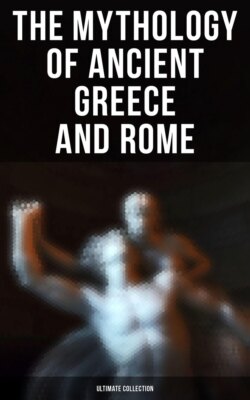Читать книгу The Mythology of Ancient Greece and Rome - Ultimate Collection - Homer - Страница 122
На сайте Литреса книга снята с продажи.
EXPLANATION.
ОглавлениеCicero mentions two Deities of the name of Bacchus; while other authors speak of several of that name. The first was the son of Jupiter and Proserpina; the second was the son of the Nile, and the founder of the city of Nysa, in Arabia; Caprius was the father of the third. The fourth was the son of the Moon and Jupiter, in honor of whom the Orphic ceremonies were performed. The fifth was the son of Nisus and Thione, and the instituter of the Trieterica. Diodorus Siculus mentions but three of the name of Bacchus; namely, the Indian, surnamed the bearded Bacchus, who conquered India; the son of Jupiter and Ceres, who was represented with horns; and the son of Jupiter and Semele, who was called the Theban Bacchus.
The most reasonable opinion seems to be that of Herodotus and Plutarch, who inform us, that the true Bacchus, and the most ancient of them all, was born in Egypt, and was originally called Osiris. The worship of that Divinity passed from Egypt to Greece, where it received great alterations; and, according to Diodorus Siculus, it was Orpheus who introduced it, and made those innovations. In gratitude to the family of Cadmus, from which he had received many favors, he dedicated to Bacchus, the grandson of Cadmus, those mysteries which had been instituted in honor of Osiris, whose worship was then but little known in Greece. Diodorus Siculus says, that as Semele was delivered of Bacchus in the seventh month, it was reported that Jupiter shut him up in his thigh, to carry him there the remaining time of gestation. This Fable was probably founded on the meaning of an equivocal word. The Greek word μηρὸς signifies either ‘a thigh,’ or ‘the hollow of a mountain.’ Thus the Greeks, instead of saying that Bacchus had been nursed on Mount Nysa, in Arabia, according to the Egyptian version of the story, published that he had been carried in the thigh of Jupiter.
As Bacchus applied himself to the cultivation of the vine, and taught his subjects several profitable and necessary arts, he was honored as a Divinity; and having won the esteem of many neighboring countries, his worship soon spread. Among his several festivals there was one called the Trieterica, which was celebrated every three years. In that feast the Bacchantes carried the figure of the God in a chariot drawn by two tigers, or panthers; and, crowned with vine leaves, and holding thyrsi in their hands, they ran in a frantic manner around the chariot, filling the air with the noise of tambourines and brazen instruments, shouting ‘Evoë. Bacche!’ and calling the God by his several names of Bromius, Lyæus, Evan, Lenæus, and Sabazius. To this ceremonial, received from the Egyptians, the Greeks added other ceremonies replete with abominable licentiousness, and repulsive to common decency. These were often suppressed by public enactment, but were as often re-established by the votaries of lewdness and immodesty, and such as found in these festivals a pretext and opportunity for the commission of the most horrible offences.
The story of the unfortunate fate of Pentheus is supposed by the ancient writers to have been strictly true. Pentheus, the son of Echion and Agave, the daughter of Cadmus, having succeeded his grandfather in his kingdom, is supposed, like him, to have opposed those abuses that had crept into the mysteries of Bacchus, and went to Mount Cithæron for the purpose of chastising the Bacchantes, who were celebrating his festival; whereupon, in their frantic madness, the worshippers, among whom were his mother and his aunt, tore him in pieces. Pausanias, however, says that Pentheus really was a wicked prince; and he somewhat varies his story, as he tells us that having got into a tree to overlook the secret ceremonies of the orgies, Pentheus was discovered by the Bacchantes, who punished his curiosity by putting him to death. The story of the transformation of the mariners is supposed by Bochart to have been founded on the adventure of certain merchants from the coast of Etruria, whose vessel had the figure of a dolphin at the prow, or rather of the fish called ‘tursio,’ probably the porpoise, or sea-hog. They were probably shipwrecked near the Isle of Naxos, which was sacred to Bacchus, whose mysteries they had perhaps neglected, or even despised. On this slender ground, perhaps, the report spread, that the God himself had destroyed them, as a punishment for their impiety.
